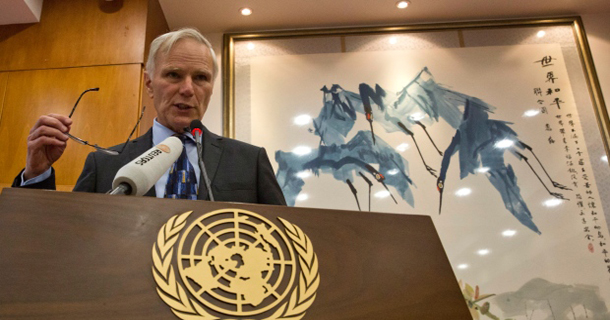
UN Special Rapporteur on extreme poverty and human rights, Philip Alston speaking in Beijing, China on August 23.
Photo:Ng Han Guan /AP
Mr Philip Alston, the United Nations(UN) Special Rapporteur on extreme poverty and human rights, has visited China, the first UN representative to visit in over ten years. He condemned the way in which he was treated, saying he was impeded whilst attempting to exercise his role there. The UN’s growing concern for restricted civil liberties within Chinese territories has been mirrored by other international organisations, with Freedom House, the United States based organisation dedicated to freedom and democracy, naming Tibet as the second worst place in the world for political rights and civil liberties.
Throughout the nine-day trip Mr Alston was accompanied by an entourage of Chinese officials and security; he said that none of the meetings he was expecting was arranged, “the message I got from many of the people I contacted was that they had been advised that they should be on vacation at this time”, he said.
Mr Alston expressed positivity regarding China’s efforts to eliminate poverty by 2020 but his report went on to assess the diminishing civil rights arena in China, coining it as the “pincer movement” – limiting the abilities of activists, lawyers, civil society organisations and non-government organisations (NGO)s to protest. Alston’s report suggested the need to “facilitate a discussion of government policies” as opposed to “simply accepting what has been determined from the top.” China has publicly dismissed his statements as lies.
Within the context of his visit, the Special Rapporteur was defining extreme poverty as involving a lack of income, a lack of access to basic services and social exclusion, social exclusion meaning where people are excluded from participating meaningfully in the political process and are denied justice for violations of their human rights. It is by this definition that Mr Alston has used an international platform to criticise China’s policies, renewing potential for global speculation on the infringement of human rights in China, including Tibet.




 Print
Print Email
Email